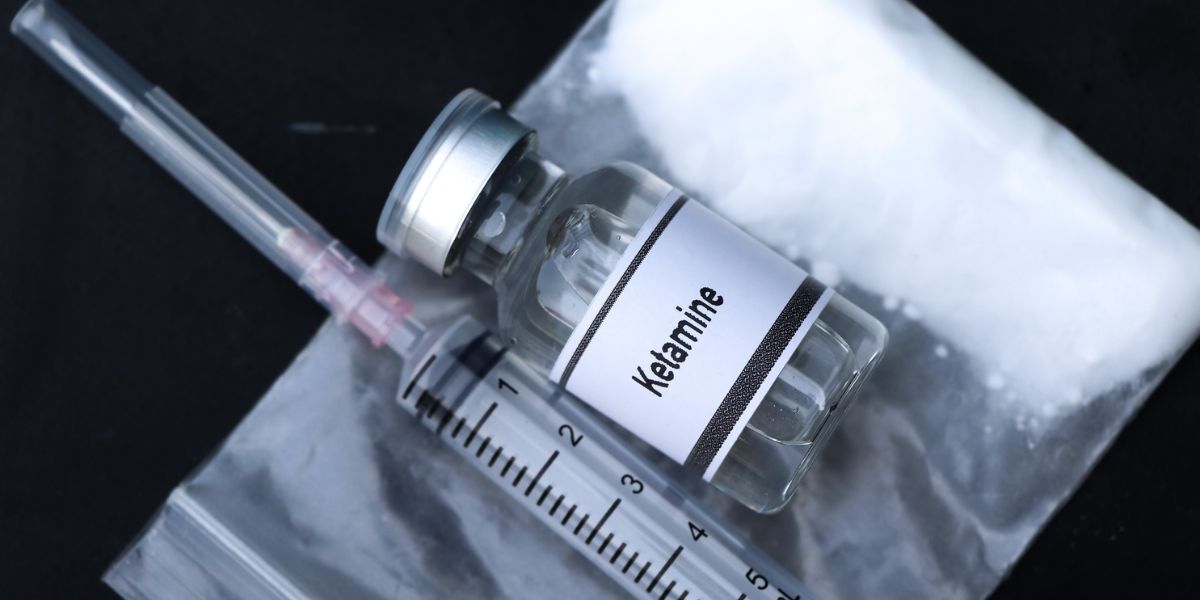Ketamine Abuse: Effects and Signs of Addiction

Ketamine abuse is common because it is easy to get and offers an intense high. People often find it in places like veterinary clinics and farms. Authorities only sanction this potent tranquilizer for restricted medical applications in humans.
Ketamine has been popular for recreational use since the 1990s. It can cause hallucinations and produce intense feelings of pleasure in small doses. Doctors are discussing using this treatment in tests to help people who are sad or stressed.
The tests have not proven the treatment’s effectiveness yet. However, this has made some people use ketamine on their own to try to fix their mental health issues, which often doesn’t end well.
More young adults are abusing ketamine, a popular drug, thinking it helps mental health. This is causing more people with ketamine addictions.
What Is Ketamine?
Ketamine is a dissociative anesthetic sanctioned for limited use in humans and animals, providing quick sedation and pain alleviation without inducing unconsciousness. Recreational users often consume it in larger quantities for its exhilarating effects and the ability to trigger astral projections.
The United States categorizes ketamine as a Schedule III controlled substance. Mainly accessible as a transparent, scentless liquid, people usually administer it through injection. People can buy ketamine as a white or off-white powder and take it by snorting or swallowing.
Common slang terms for ketamine include:
- K
- Special K
- Vitamin K
- Ket
- Horse tranquilizer
- Kit kat
Dealers occasionally sell ketamine combined with other drugs, such as heroin or ecstasy, using it as a cutting agent to enhance their potency.
What Does Ketamine Feel Like?
Doctors use ketamine medically as a sedative and pain reliever. Doctors use it for procedures that do not require full sedation. These procedures include fixing dislocated joints or calming anxious patients in emergencies.
Recently, experts have been studying how ketamine can help with severe depression and suicidal thoughts in clinical trials.
Ketamine is a recreational drug that is taken in small amounts to help people relax and feel happy. It can also make things look and sound different. When people take more of it, they look for a stronger, happy feeling, which can leave users feeling detached from reality or in a different state where their mind and body feel apart from everything around them.

Is Ketamine Addictive?
Some people say taking ketamine feels like almost dying, seeing things that aren’t there, and forgetting a lot. Also, ketamine is often used to harm others without them knowing, making it hard for them to fight back against unwanted touches.
Mixing ketamine with alcohol and other illegal drugs makes its effects stronger and raises the chance of getting addicted. Also, if someone stops using ketamine suddenly after using it a lot for a long period of time, they might have terrible withdrawal symptoms. This can make them keep using the drug to stay away from those bad feelings.
Effects of Ketamine
The effects of ketamine change depending on how much is taken to get the high people want. The most extreme effect is called a K-hole, but there are other effects, both wanted and not wanted, that people feel before they have a near-death or out-of-body experience.
Ketamine starts working fast, with the strongest high happening between 45-60 minutes, but some effects can last up to 24 hours later, especially if a lot is taken.
Ketamine can cause the following effects:
- Deep happiness
- Peacefulness
- A sensation of tingling throughout the body
- Feeling of sickness
- Vomiting
- Dilated pupils
- Altered visual and auditory perception
- Distorted perception of time
- Lack of coordination
- Poor decision-making
- A state similar to a trance
- Hypertension
- Slowed breathing
- Rapid heartbeat
- Rigid, unmovable limbs
- Unresponsiveness to stimuli
- Bewilderment
- Disorientation
- Skin rashes
- Excessive salivation
- Unconsciousness
- Amnesia
- Hearing and seeing things that aren’t there
- Convulsions
- Incontinence
Taking too much ketamine, using it long-term, or mixing it with other drugs that slow you down can raise the chance of severe side effects and ketamine overdose. People in a K-hole could face heart problems, fall into a coma, or choke on vomit.
Should the impacts of ketamine seem potentially fatal, promptly dial 911 or rush to the closest emergency department.
Signs and Symptoms of Ketamine Addiction
Ketamine is a strong anesthetic that separates the mind from the body. It can be hard to hide addiction or misuse of ketamine, even if someone tries to do so.
Addiction doesn’t start with someone constantly looking out of it and discussing drugs, including ketamine. Usually, the signs of ketamine abuse appear slowly and once in a while at first, and then they get worse over time.
Identifying substance abuse in its early stages is important. This way, you can have a conversation with your loved one. You can also help them access the support they require. Indications and symptoms of ketamine addiction and misuse include:
- Regularly seeming lethargic or slow
- Extreme tiredness and sleepiness
- Recurring urinary tract and kidney infections
- Trouble concentrating
- Feelings of depression and anxiety
- Escalating mental health issues
- Concealing behavior and dishonesty about ketamine consumption
- Presence of needles, empty containers, and other drug-related items
- Ignoring personal and work-related responsibilities
- Deteriorating personal cleanliness
- Financial difficulties
- Legal issues
- Unstable housing situation
- Social withdrawal
- Persistent health issues
- Delayed healing or infected injuries, particularly at injection sites
- Thoughts of suicide
- Withdrawal symptoms when ketamine is not available
People addicted to ketamine should get help from professionals and think about treatment options before trying to quit alone. Successfully overcoming ketamine addiction involves enduring withdrawal, which can be intense and difficult to manage without proper support.

Ketamine Withdrawal Symptoms
Ketamine withdrawal can be challenging, uncomfortable, and very strong, but it usually isn’t deadly. Still, the chance of going back to using it is high, and the mental effects of withdrawal can be just as significant and risky as the physical ones. How long and how hard ketamine withdrawal hits can be different for everyone. Typically, it begins within 24 hours following the final dose and can persist for a week.
Ketamine withdrawal symptoms include:
- Perspiration
- Uneasiness
- Irritability
- Fluctuations in hunger
- Tiredness
- Weakness in muscles
- High temperature
- Shivering
- Pain in muscles and joints
- Stomach cramps
- Sickness
- Light-headedness
- Pain in the bladder and unease while urinating
- Craving for water
- Slowed reflexes
- Loss of memory
- Vision that is blurred or warped
- Worry
- Low mood
- Disturbances in sleep
- Suicidal thoughts or self-injury tendencies
People who mix ketamine and alcohol often have more severe withdrawal symptoms. These symptoms can include seizures and prolonged withdrawal syndrome (PAWS) from alcohol.
Mixing these substances puts individuals at a higher risk for these dangerous effects. If you use ketamine to self-medicate for depression or other disorders, you may experience rebound symptoms. These symptoms can be stronger than the original ones. Supervised medical detox helps reduce severe withdrawal symptoms and lowers the risk of complications and long-term effects.
Get Ketamine Addiction Treatment
No matter the circumstances of your drug abuse and ketamine addiction, assistance is accessible.
At Northridge Addiction Treatment Center, we use a holistic and evidence-based approach to help our residents overcome addiction. Our approach addresses all aspects of addiction. We offer onsite medical detox with continuous support and care to ensure a safe and comfortable withdrawal process.
Our method helps identify and address co-occurring disorders through therapy. This therapy helps build habits, skills, and confidence. These tools are essential for long-term recovery.
A new life grounded in recovery is within reach. Our expert treatment team is ready to speak with you. Contact us today.
Find Meaningful Recovery
Our caring and compassionate specialists are eager to help you comfortably navigate this journey to recovery. Our individualized treatment plan, programs, and therapies may be a perfect match for you or your loved one. Let us assist you in living the happy life you deserve. It starts with a phone call.




